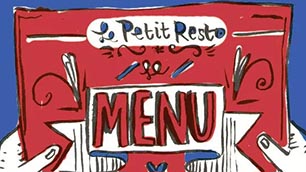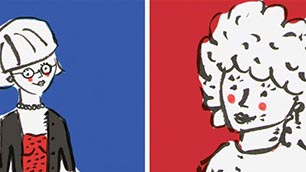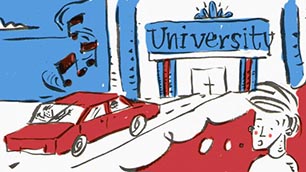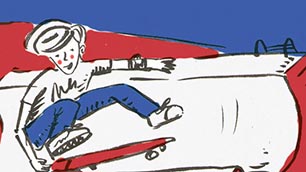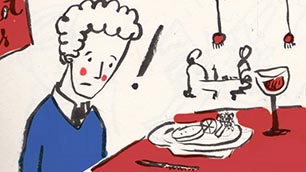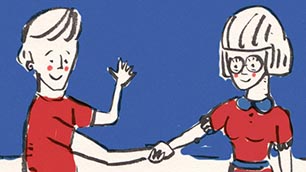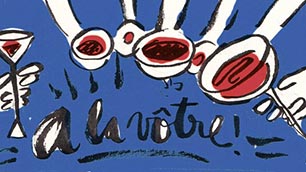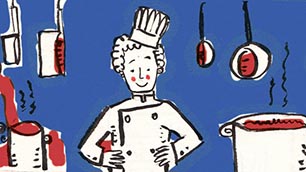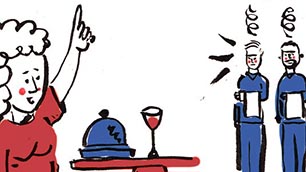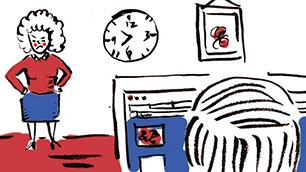| Valérie: | Bonjour Jacques ! Bienvenue ! |
| Jack: | Bonjour Valérie ! |
| Valérie: | Ça va ? |
| Jack: | Oui, ça va, merci. |
| Valérie: | Jacques, vous êtes en retard ! |
| Jack: | En retard ? |
| Valérie: | Non, non Jacques. It’s not what you think! Vous êtes en retard. You are late. |
| Jack: | Oh! Oui, pardon. Je suis très très sorry. I didn’t even have time to eat breakfast. |
| Valérie: | It’s alright, Jacques, it happens. I just wasn’t sure if you had decided to quit. |
| Jack: | Quit? Never! I’m not a quitter! Je suis un fighter, you’ll see. |
| Valérie: | I’m glad vous êtes déterminé. Learning a language requires a great deal of determination and self-discipline. |
| Jack: | Which I have. Je suis just a little upset this morning. |
| Valérie: | Vous êtes juste un peu perturbé ce matin ? Pourquoi ? |
| Jack: | Why? Why je suis perturbé ? |
| Valérie: | Oui, pourquoi Jacques? |
| Jack: | Well, if you really want to know... but I can’t tell you en français. My problème est complicated. |
| Valérie: | Compliqué ? Je suis sûre que vous êtes capable d’expliquer en français. |
| Jack: | Repeat s’il vous plaît ? |
| Valérie: | Je suis sûre que vous êtes capable d’expliquer en français. |
| Jack: | Sûre... sure; capable... capable, able; expliquer... explain? |
| Valérie: | Excellent Jacques ! Vous êtes intelligent. |
| Jack: | You see Valérie, je suis déterminé ! |
| Valérie: | En effet Jacques, vous êtes déterminé. |
| Jack: | Je suis capable d’expliquer en français. Je suis déterminé ! I tell you who else is determined though. My investors! Ils sont déterminés to make my project fail! They’re just not modern enough in their thinking. Ils sont stupid! Ils sont so backward! |
| Valérie: | Ok, Jacques, let’s use another term to describe les investisseurs. Instead of stupid, we could say... |
| Jack: | Idiots? Les investisseurs sont idiots. Parfait ! |
| Valérie: | I was thinking of something a bit more polite. How about arriéré ? |
| Jack: | Arriéré, arriéré, arriéré... |
| Valérie: | That means backward. Or limité ? |
| Jack: | Limité, oui, c’est bien. Les investisseurs sont limités. |
| Valérie: | How would you tell them that? |
| Jack: | Vous êtes limités. |
| Valérie: | Très bien. And why do you think they are limited? |
| Jack: | Well, I met them once and, to be honest, they weren’t too excited about my concept. They told me to make a few changes and to present it again today. I think I can convince them, especially the few women investors. I feel they liked it better than the men. |
| Valérie: | It’s probably because they’ve been on a few embarrassing dates themselves! |
| Jack: | Probably. There’s quite a lot of victims out there! Mon restaurant will put an end to that! |
| Valérie: | Bonne chance Jacques! What about us? Are we limited? |
| Jack: | Non, nous sommes pas limités. No, no, hang on... nous ne sommes pas limités. |
| Valérie: | I see you remember how to conjugate a verb in the negative form. Très bien ! We’ll talk about it today too. Now let’s conjugate the whole verbe être with limité as an adjective. |
| Jack: | Je suis limité... let’s change the adjective, shall we? |
| Valérie: | D’accord, use any words you like. |
| Jack: | D’accord. Je suis déterminé, tu es intelligent, il est perturbé, elle est capable, nous sommes en retard, vous êtes limités, ils sont retarded... les investisseurs. Oops, sorry, ils sont en retard, elles sont en retard. |
| Valérie: | Merci Jacques ! Well, we’ve reviewed le verbe être, thanks to your investors. |
| Jack: | Huh! |




